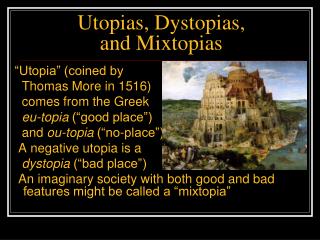

The prince is elected for life, but can be removed from office for tyranny. A body of wise and educated representatives deliberates on public affairs, and the country is governed by a prince, selected from among candidates chosen by the people. Everyone works only six hours a day this is sufficient because the people are industrious and do not require the production of useless luxuries for their consumption. The rural population lives in communal farmhouses scattered through the countryside. The people live in 54 cities, separated from each other by a distance of at least 24 miles. Agriculture is treated as a science and taught to children as part of their school curriculum every citizen spends some of his life working on a farm. Citizens hold property in common, and care is taken to teach everyone a trade from which he can make a living, so that there is no need for crime. Utopia is a perfect society, where poverty and misery have been eliminated, there are few laws and no lawyers, and the citizens, though ready to defend themselves if necessary, are pacifists. The term “Utopia” was coined by Thomas More as the name for the ideal state in his book, "Utopia," which described a fictional perfect society Utopianism plays an important role in motivating social and political change.

It is usually characterized by optimism that an ideal society is possible. Utopian thought deals with morality, ethics, psychology, and political philosophy, and often originates from the belief that reason and intelligence can bring about the betterment of society. Utopianism refers to the various ways in which people think about, depict, and attempt to create a perfect society. The term “Utopia” was coined by Thomas More from the Greek words ou (no or not), and topos (place), as the name for the ideal state in his book, De optimo reipublicae statu deque nova insula Utopia (Louvain, 1516). Utopia is a term denoting a visionary or ideally perfect state of society, whose members live the best possible life. This artist showed in his paintings part of the desires that induce human beings in pursuit of a heaven on earth. Left panel ( The Earthly Paradise, Garden of Eden), from Hieronymus Bosch's The Garden of Earthly Delights.


 0 kommentar(er)
0 kommentar(er)
